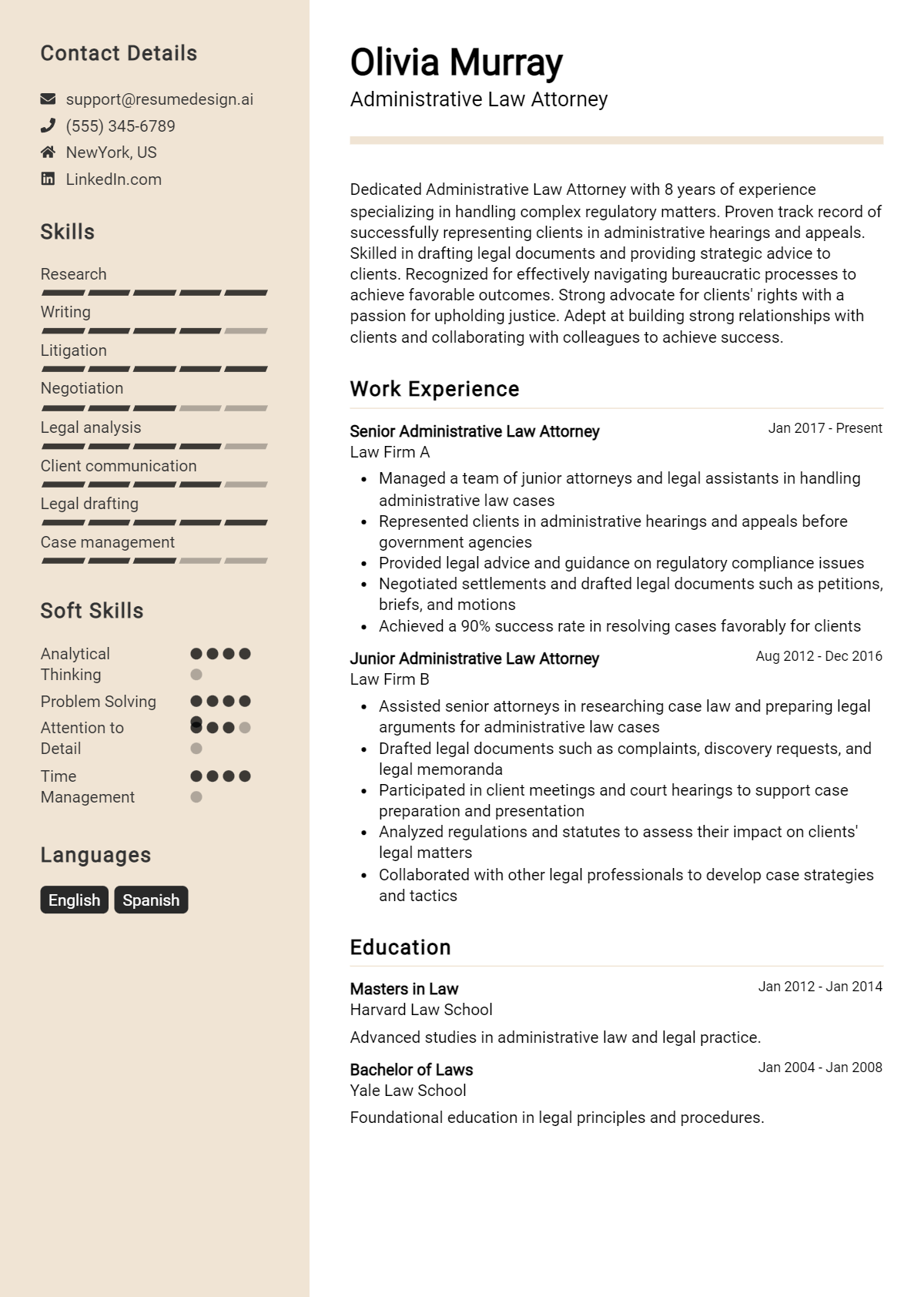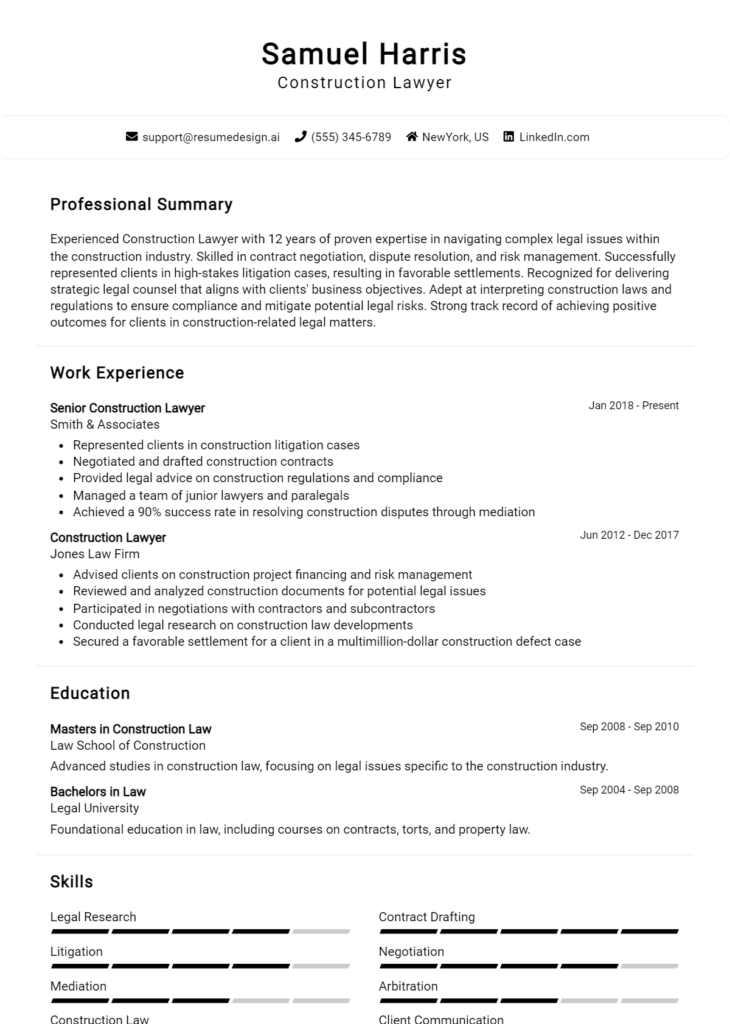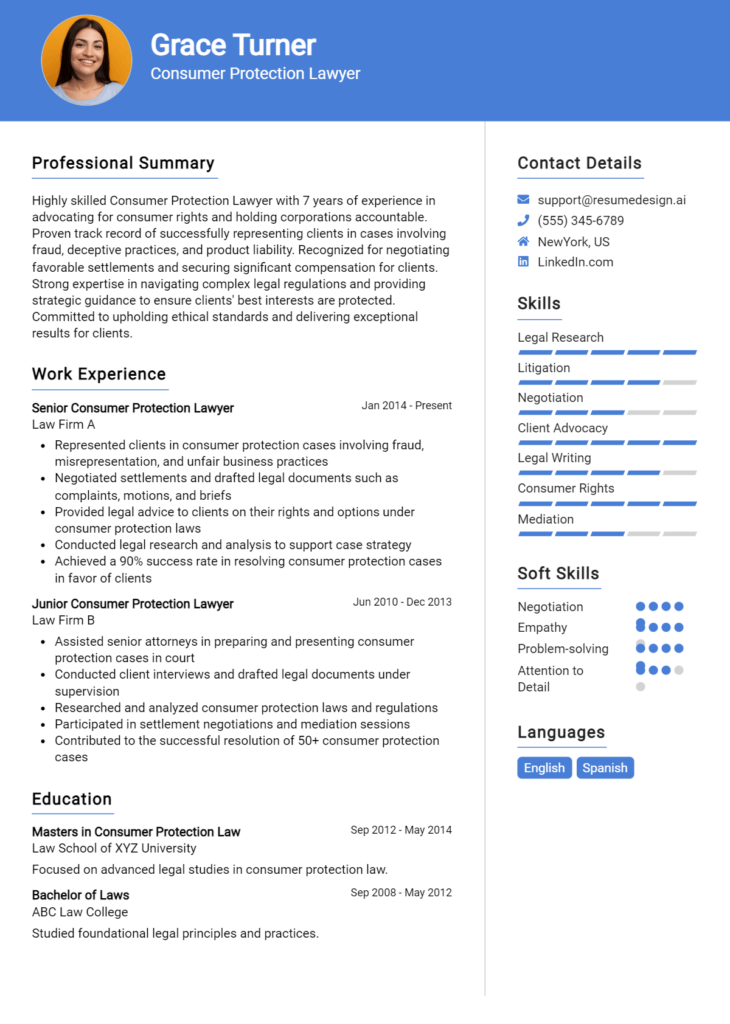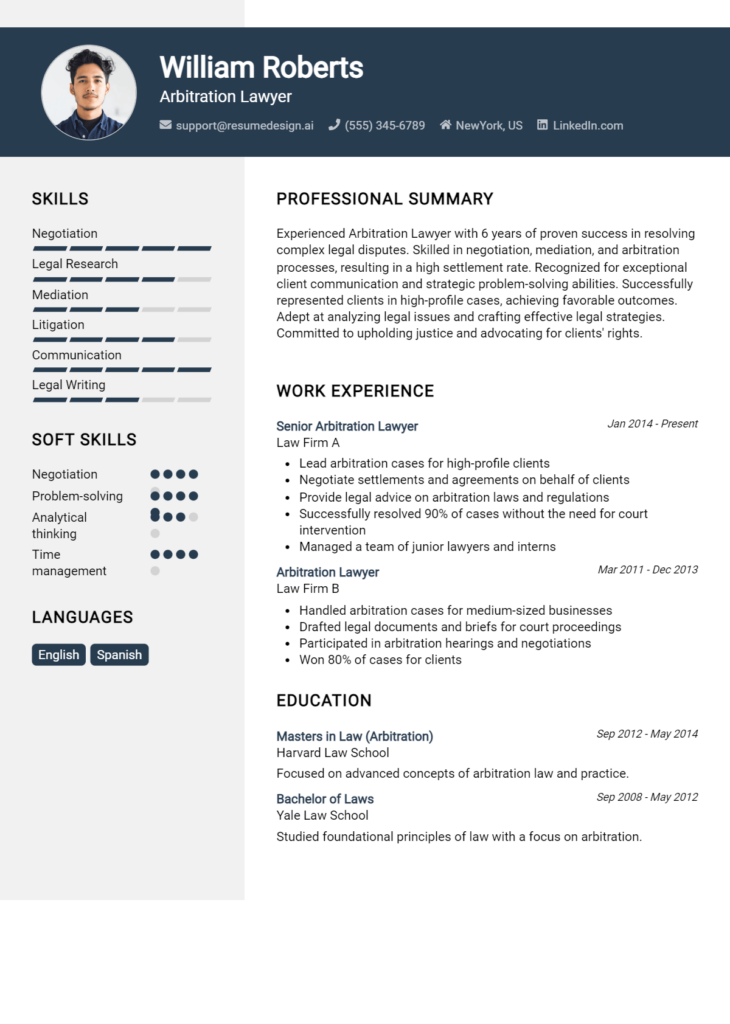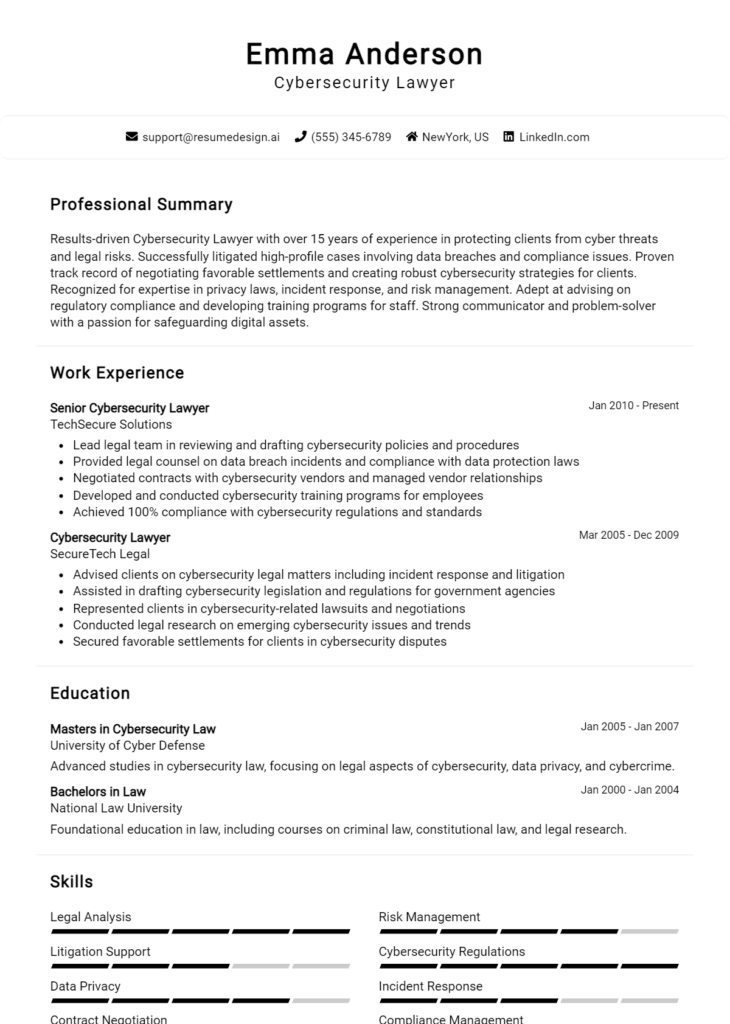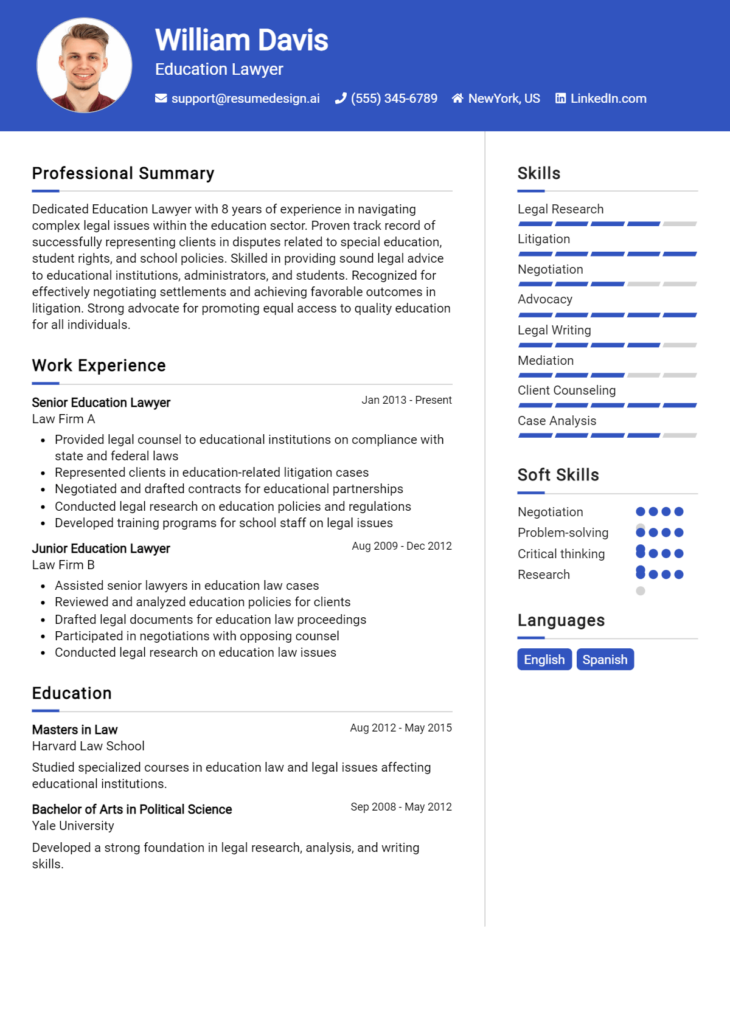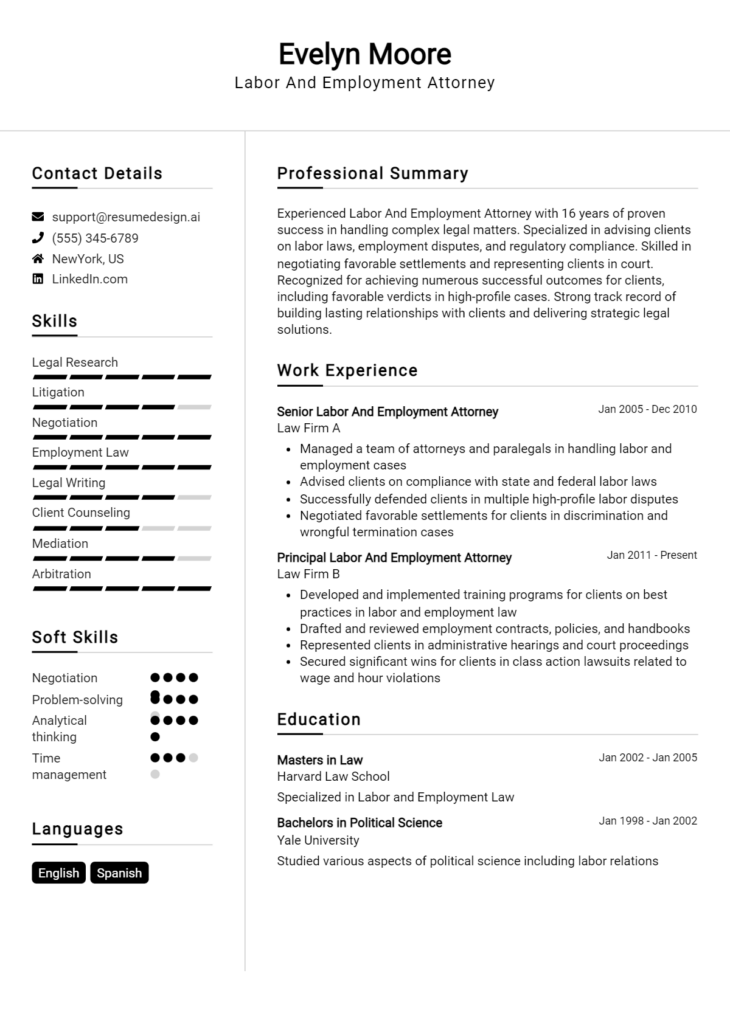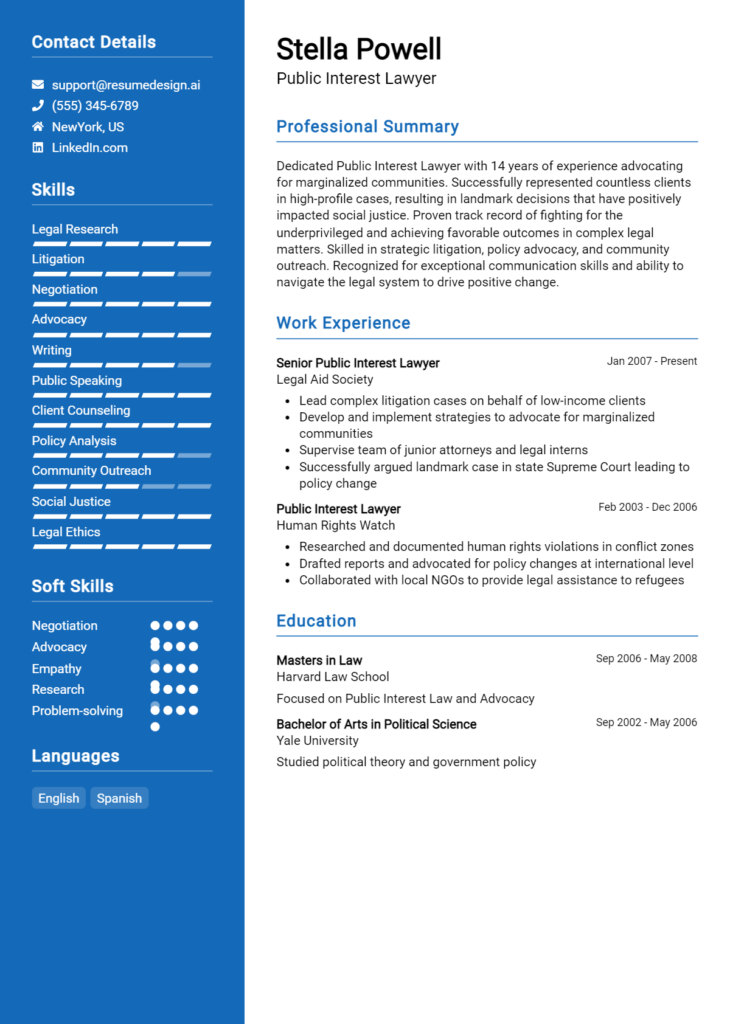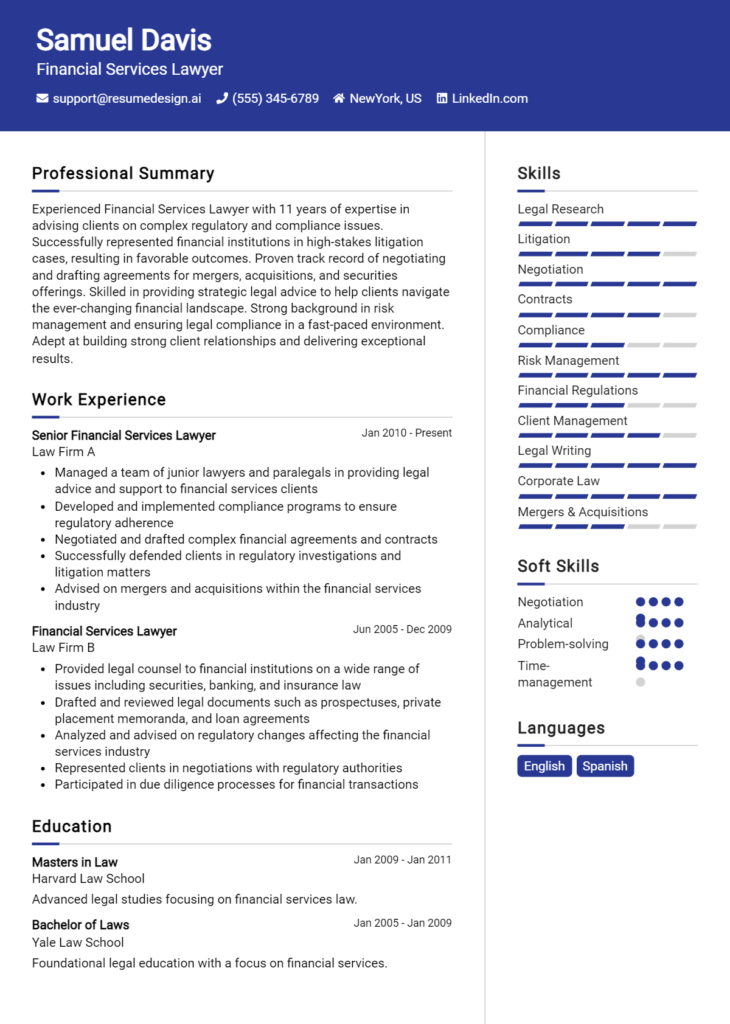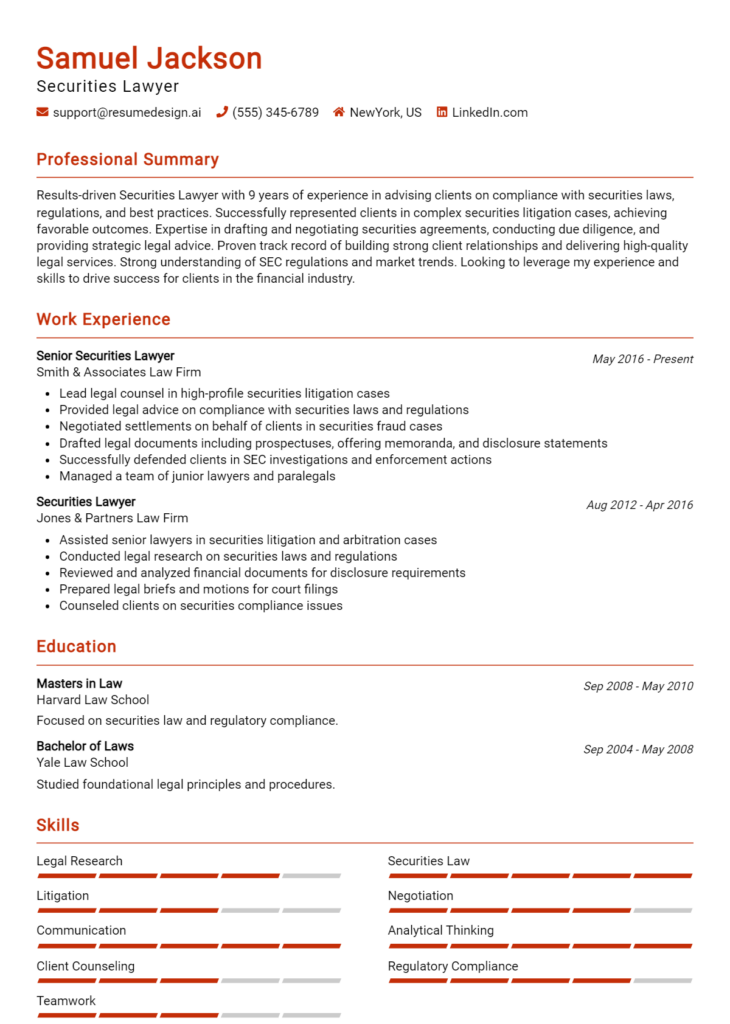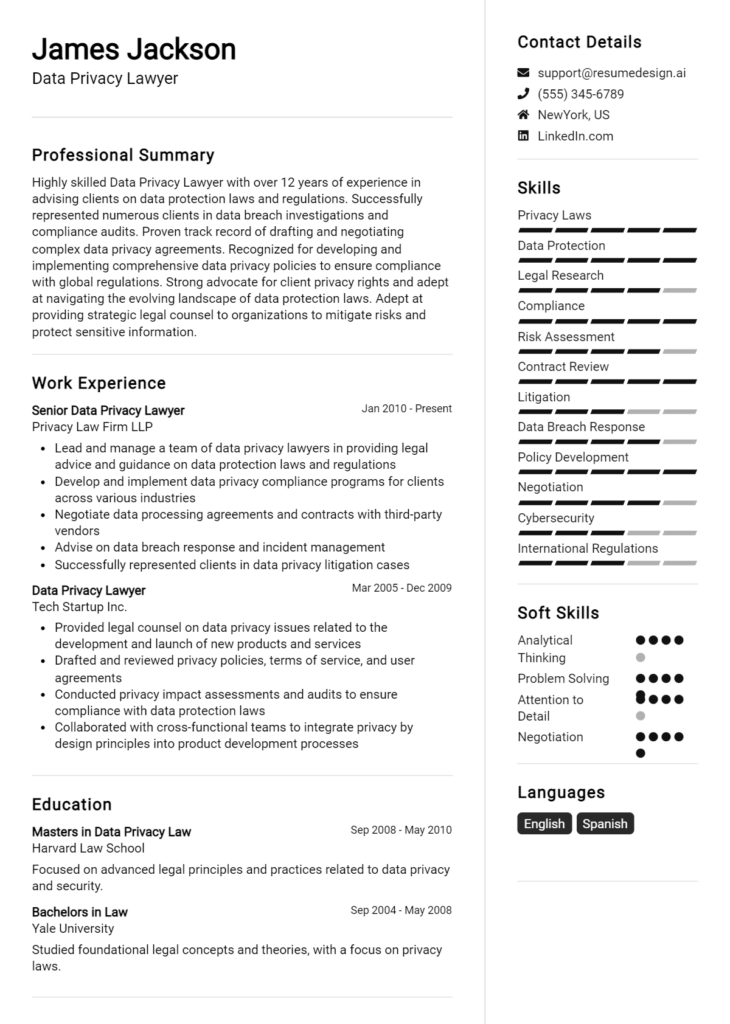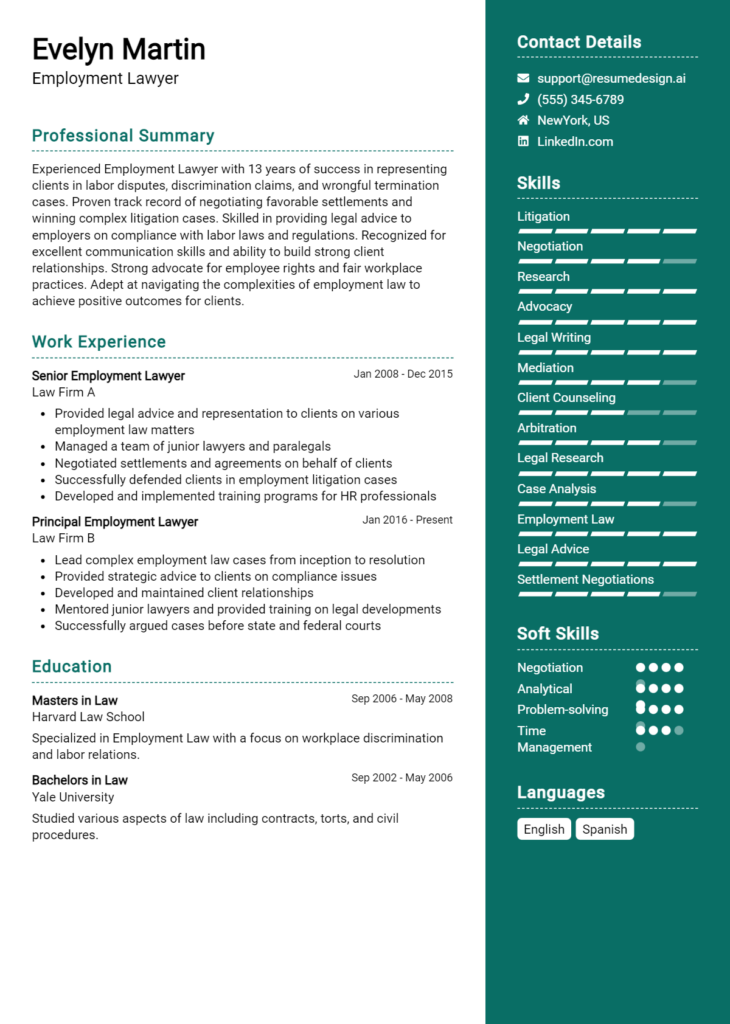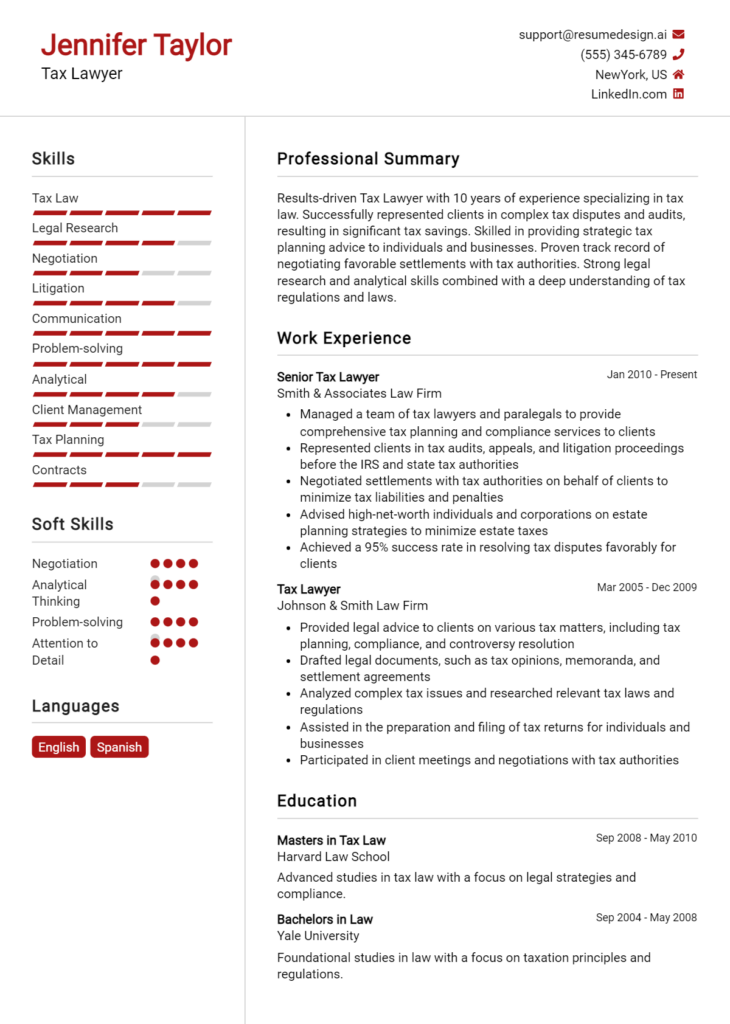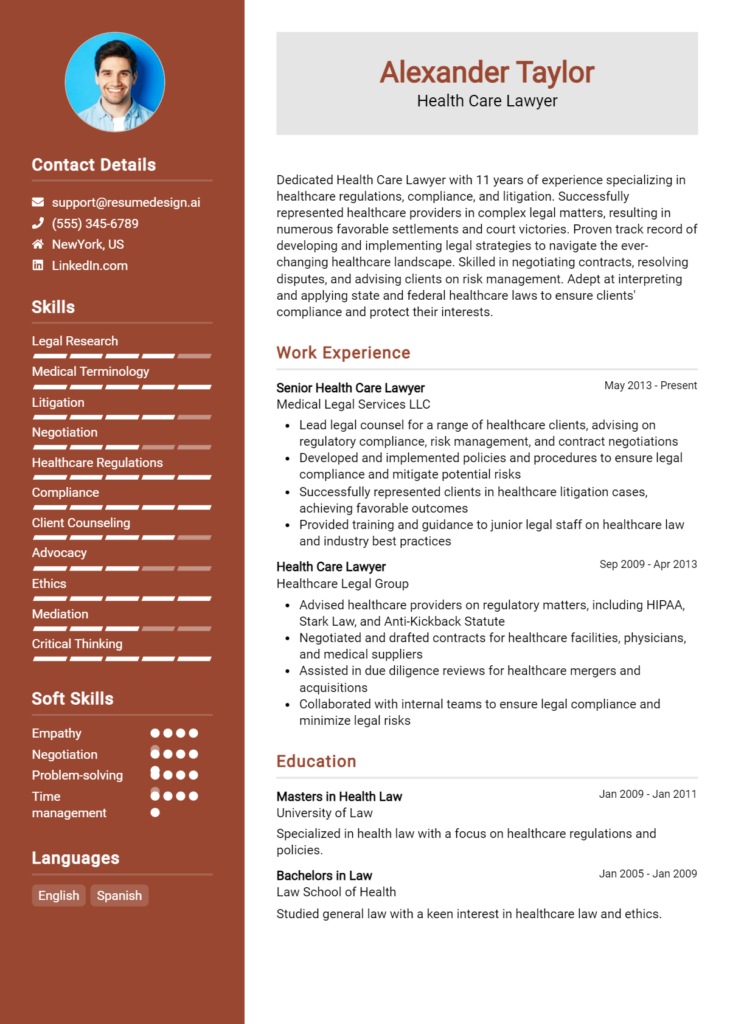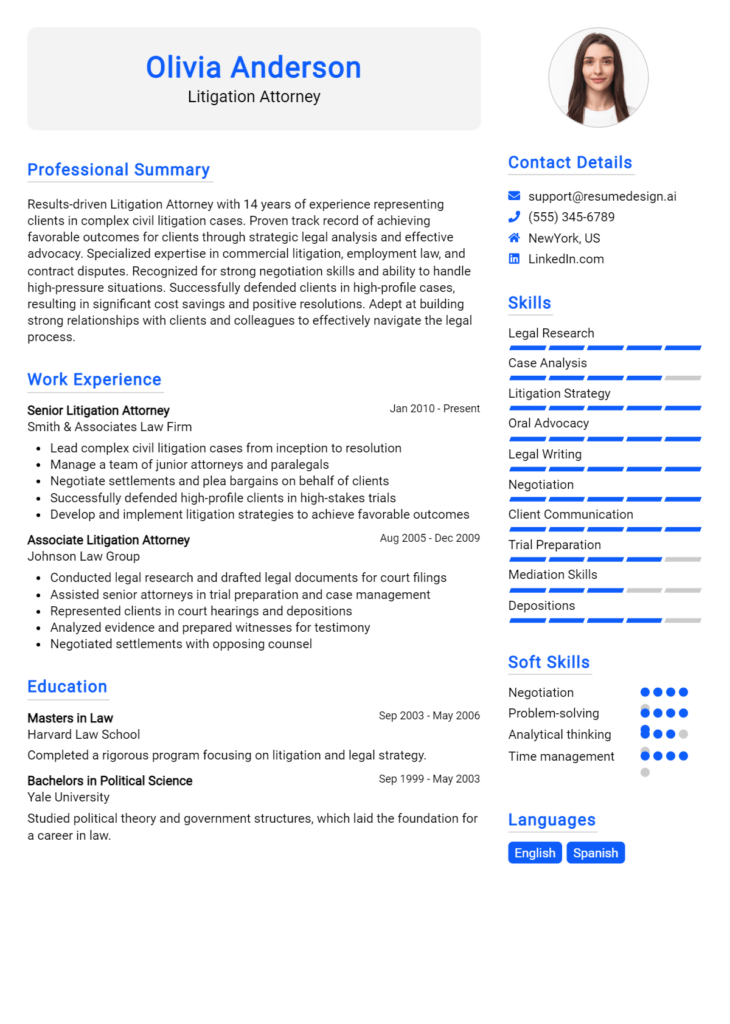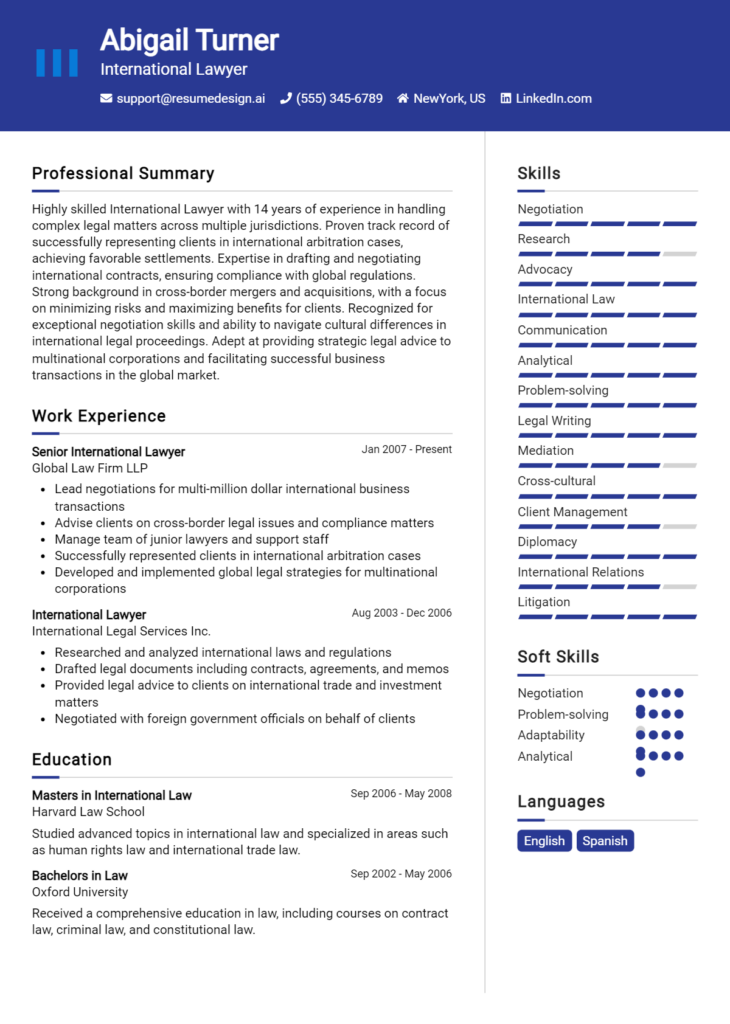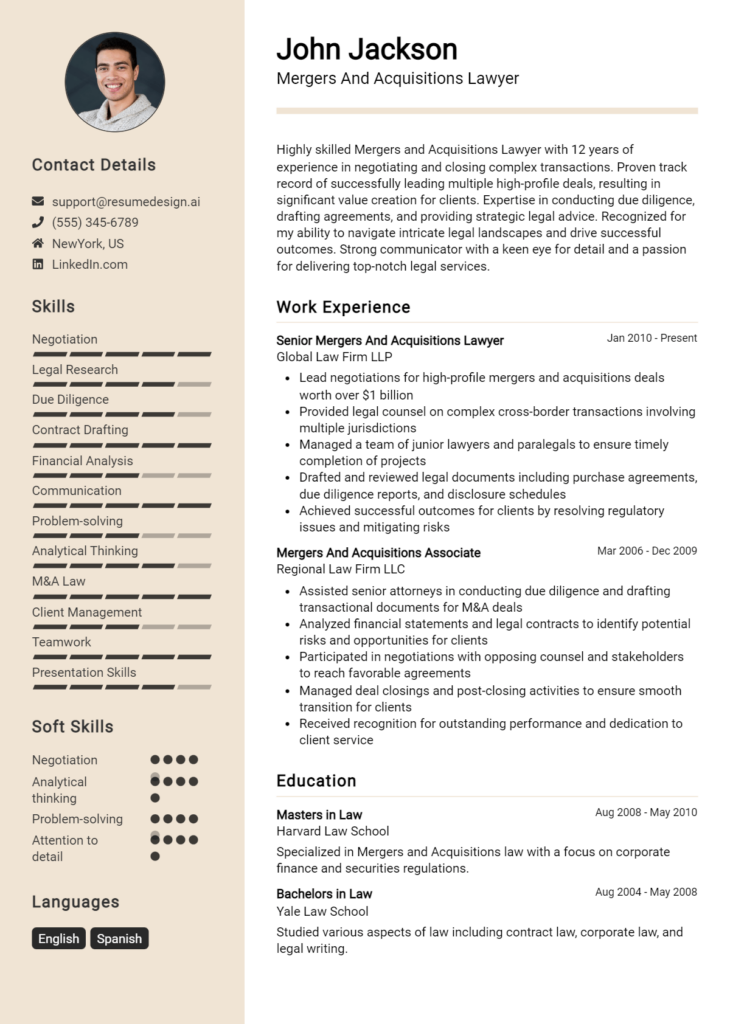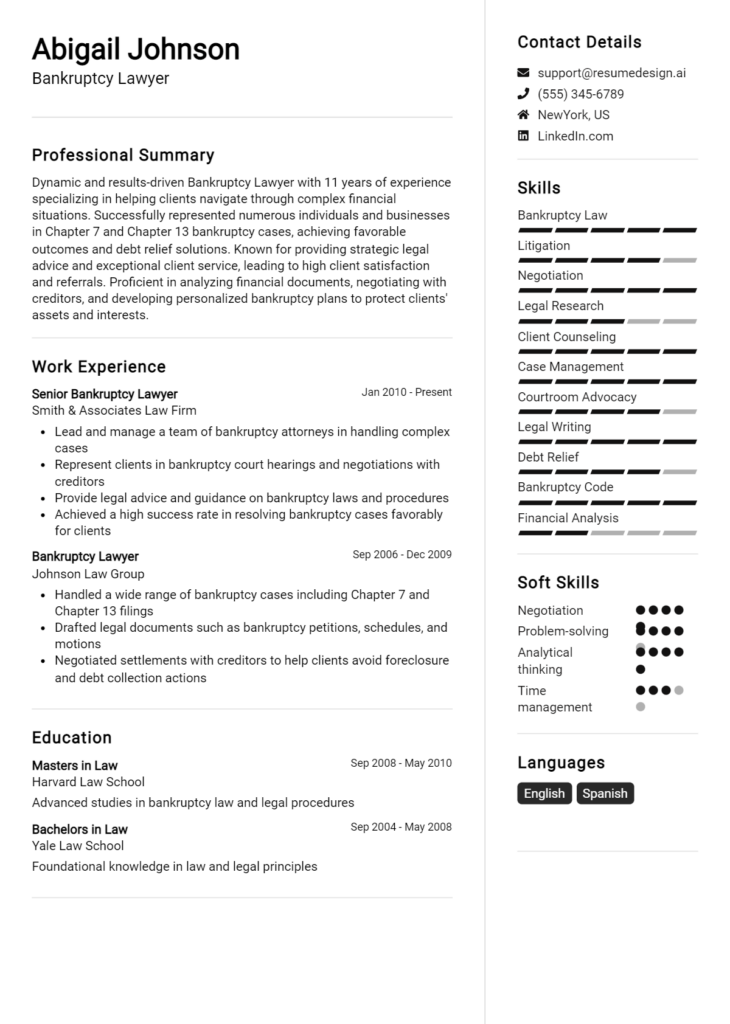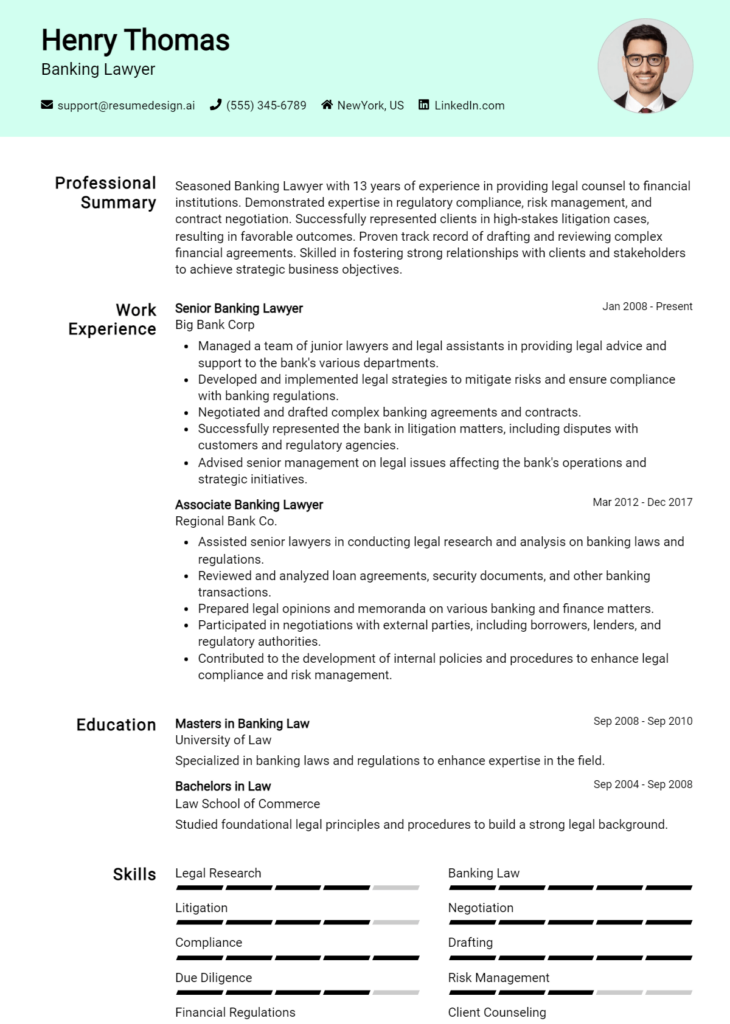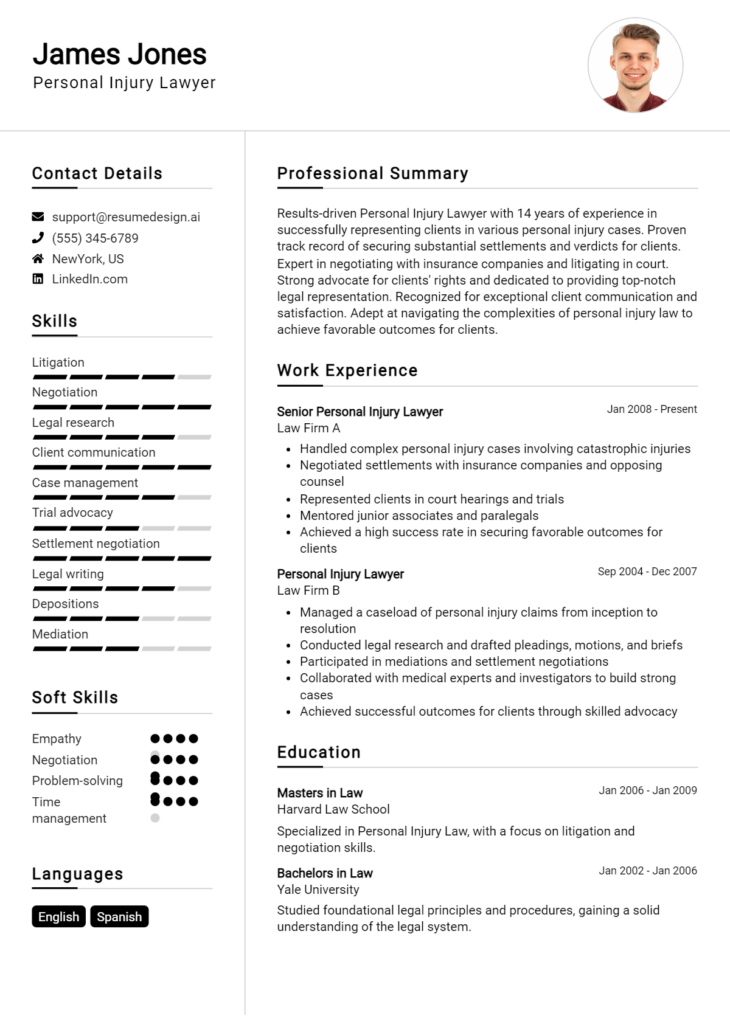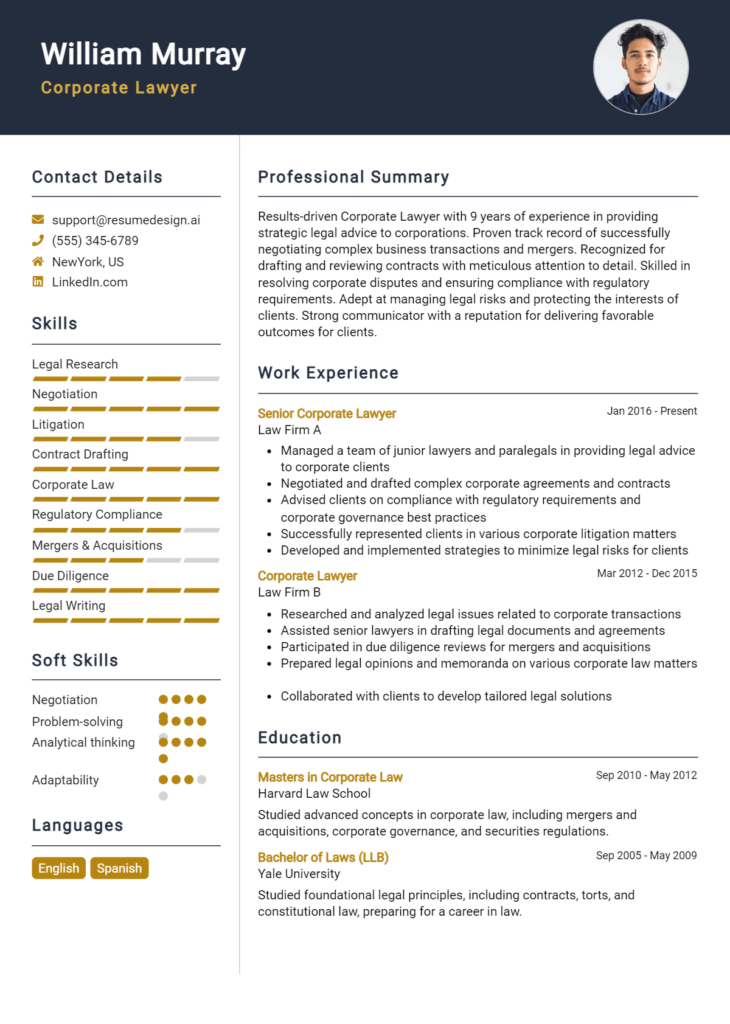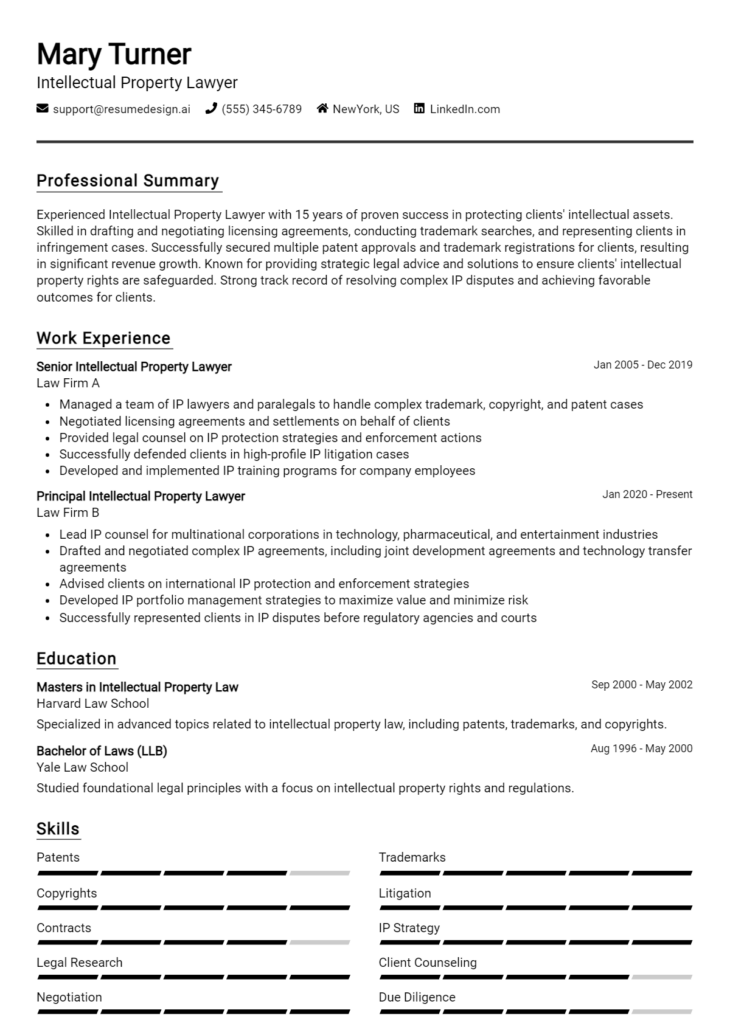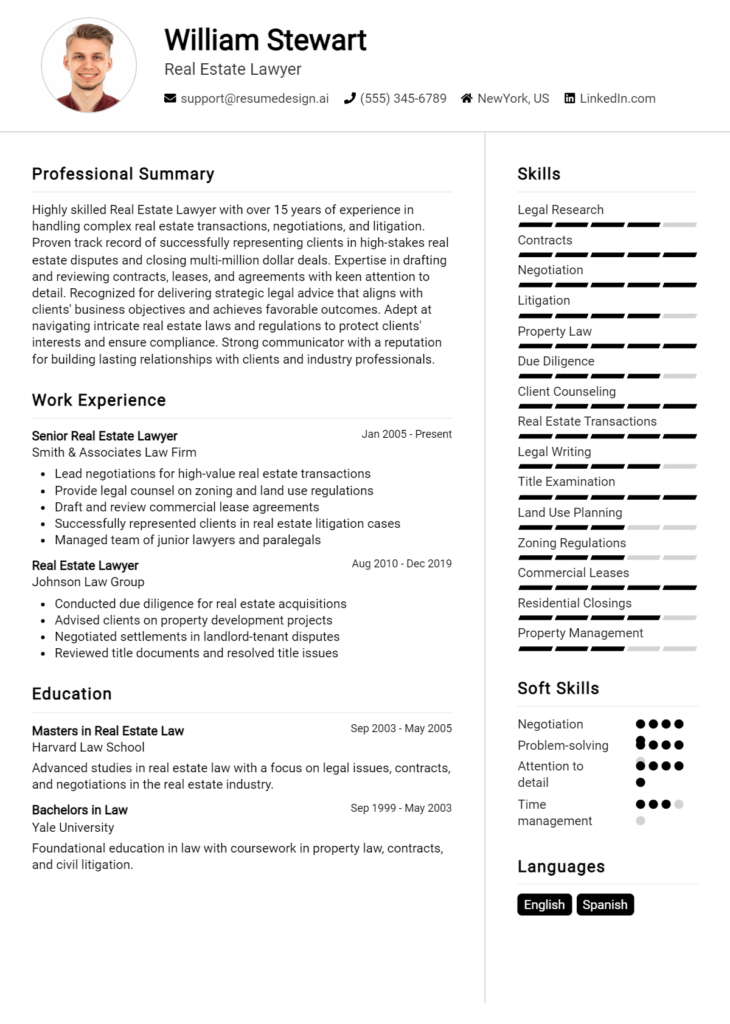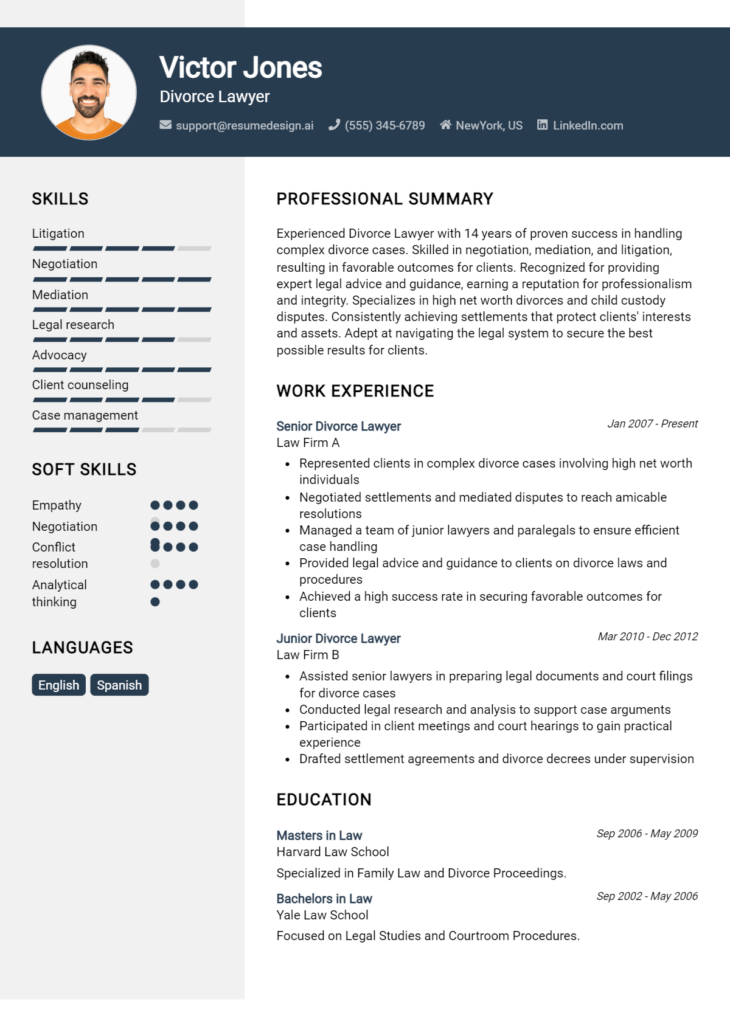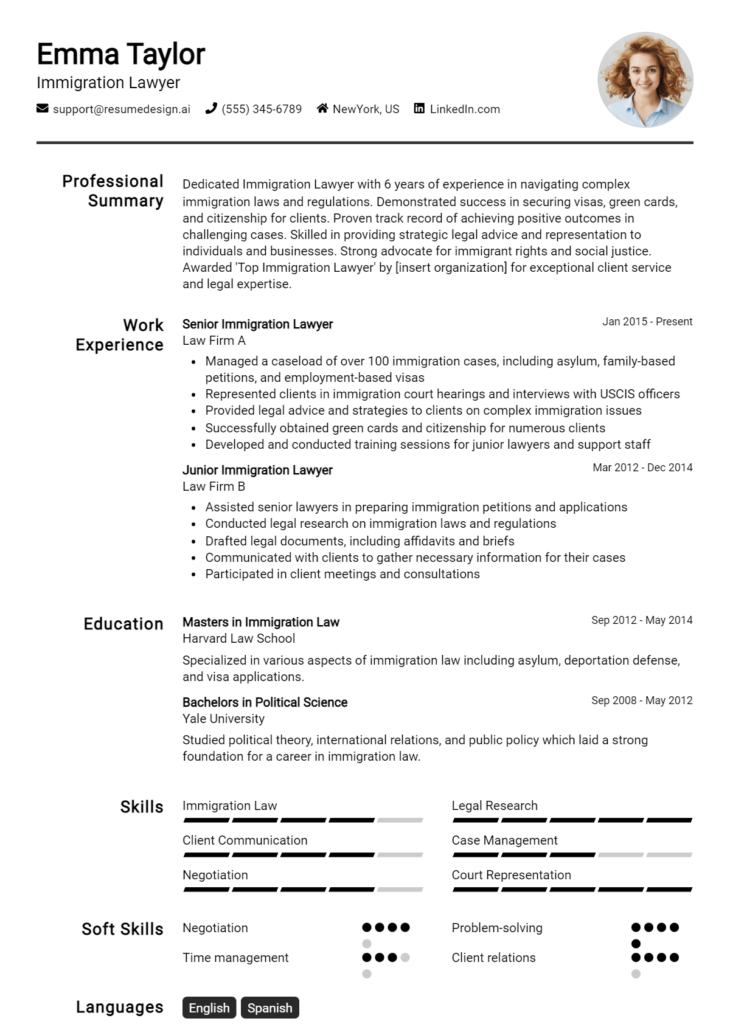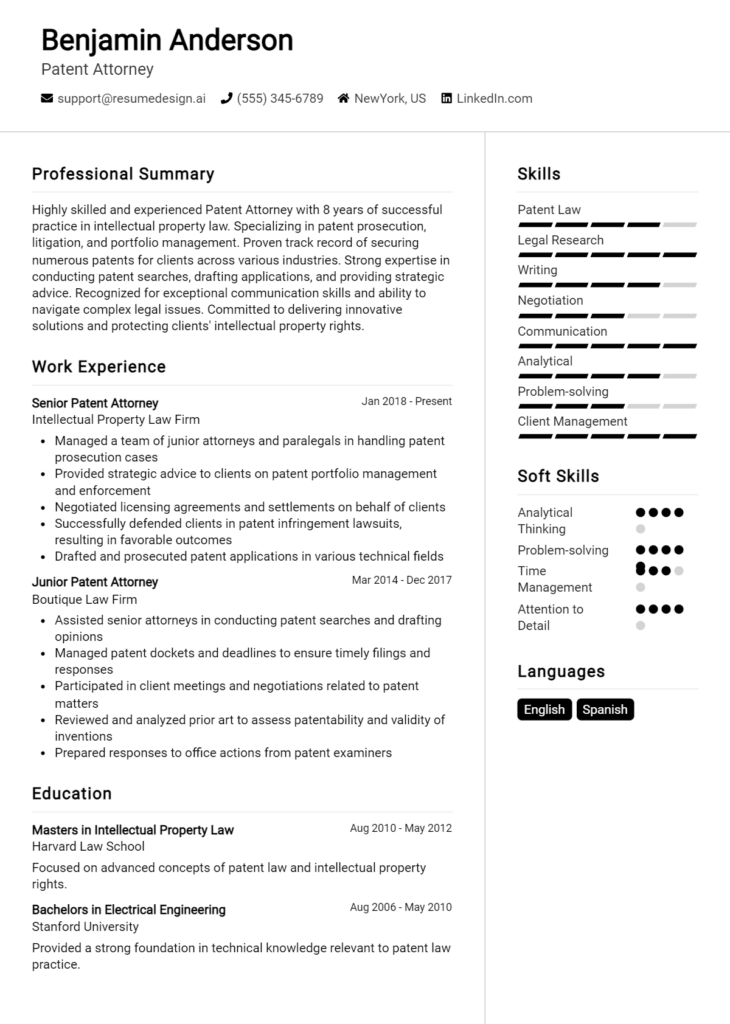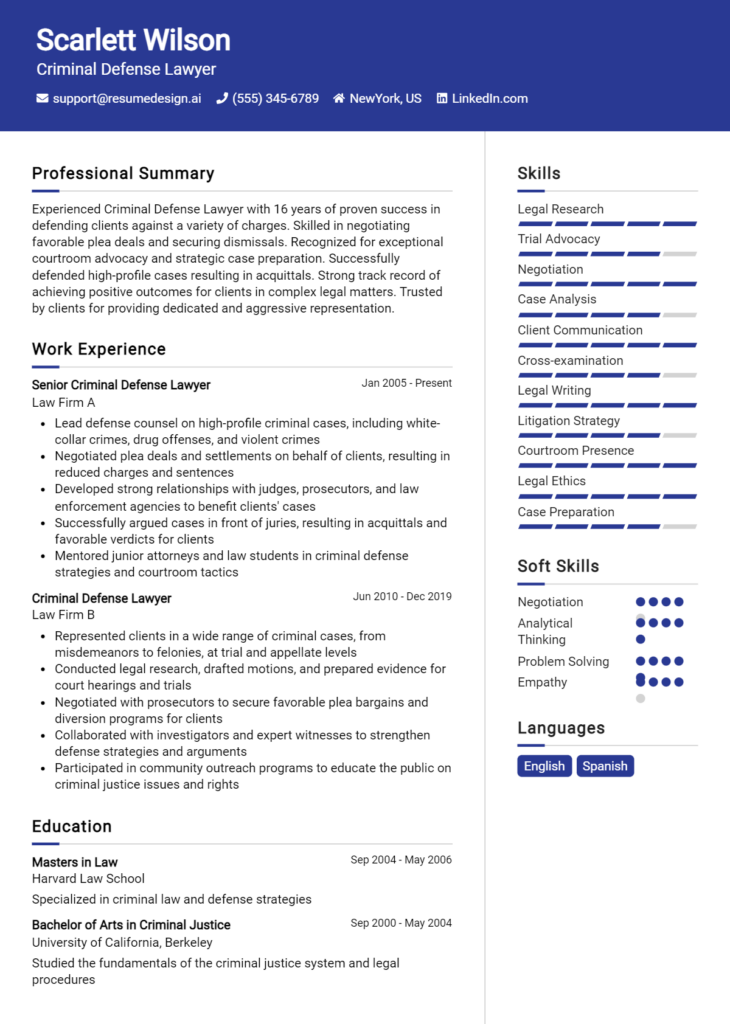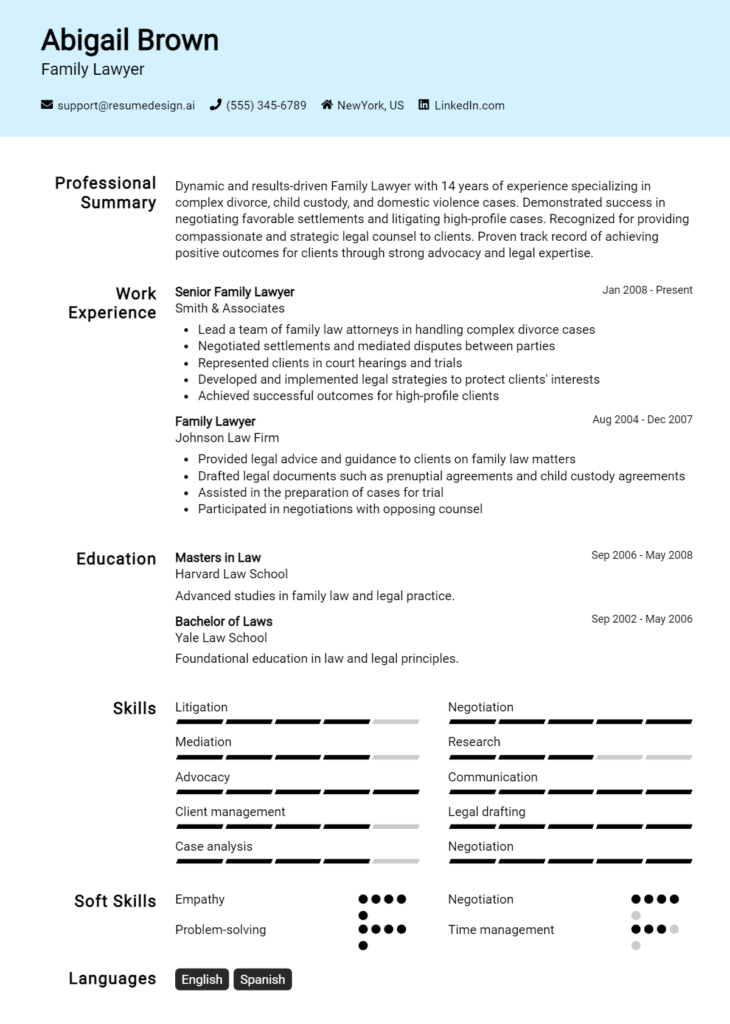Administrative Law Attorney Core Responsibilities
An Administrative Law Attorney plays a crucial role in navigating the complex intersection of law and government regulations. Their key responsibilities include representing clients in administrative hearings, interpreting legislation, and advising on compliance with administrative rules. Strong technical, operational, and problem-solving skills are essential, as they facilitate effective communication between different departments and ensure that complex legal issues are resolved efficiently. A well-structured resume highlighting these abilities can significantly enhance an attorney's appeal to potential employers, aligning with the organization's overarching objectives.
Common Responsibilities Listed on Administrative Law Attorney Resume
- Represent clients in administrative hearings and proceedings.
- Research and interpret federal, state, and local regulations.
- Draft legal documents, including briefs and motions.
- Advise clients on compliance with administrative laws and regulations.
- Negotiate settlements on behalf of clients.
- Assist in the preparation of cases for trial.
- Conduct legal research to support case strategy.
- Monitor changes in legislation affecting administrative law.
- Collaborate with government agencies and other stakeholders.
- Provide training to clients on regulatory compliance.
- Prepare and present oral arguments in administrative hearings.
- Maintain detailed records and documentation related to cases.
High-Level Resume Tips for Administrative Law Attorney Professionals
In the competitive field of administrative law, a well-crafted resume is not just a document; it's your personal branding tool that can open doors to new opportunities. Your resume is often the first impression you make on a potential employer, and it needs to reflect not only your skills and qualifications but also your unique achievements in the legal field. As an Administrative Law Attorney, your resume should effectively communicate your expertise in navigating complex regulations, advocating for clients, and resolving disputes. This guide will provide practical and actionable resume tips specifically tailored for Administrative Law Attorney professionals, ensuring you stand out in a crowded job market.
Top Resume Tips for Administrative Law Attorney Professionals
- Tailor your resume to each job description, emphasizing the specific skills and experiences that align with the role.
- Showcase relevant experience in administrative law, including internships, clerkships, and previous positions held.
- Quantify your achievements by including metrics, such as the number of cases managed, successful outcomes, or regulatory compliance improvements.
- Highlight industry-specific skills, such as knowledge of administrative procedures, regulatory compliance, and dispute resolution techniques.
- Incorporate keywords from the job listing to optimize your resume for Applicant Tracking Systems (ATS).
- Use a clear, professional format that enhances readability, making it easy for hiring managers to find key information quickly.
- Include a strong summary statement that captures your professional identity and outlines your career goals in administrative law.
- Demonstrate your commitment to continuous learning by mentioning relevant certifications, trainings, or memberships in professional organizations.
- Highlight your writing and communication skills, as these are critical in drafting legal documents and interacting with clients and agencies.
By implementing these tips, you can significantly increase your chances of landing a job in the Administrative Law Attorney field. A polished and targeted resume not only showcases your qualifications but also demonstrates your professionalism and attention to detail, qualities that are highly valued in the legal profession.
Why Resume Headlines & Titles are Important for Administrative Law Attorney
In the competitive field of administrative law, crafting an impactful resume is essential for standing out among other candidates. A strong headline or title serves as the first impression, immediately grabbing the attention of hiring managers and conveying a candidate's core qualifications in a succinct manner. A well-designed resume headline not only summarizes the applicant's expertise but also aligns closely with the specific job they are applying for. This strategic approach ensures that hiring managers can quickly identify key skills and experiences, making it more likely for a candidate to progress to the next stage of the hiring process.
Best Practices for Crafting Resume Headlines for Administrative Law Attorney
- Keep it concise: Aim for one impactful phrase that captures your qualifications.
- Be role-specific: Tailor your headline to reflect the specific administrative law position you're targeting.
- Highlight key skills: Focus on your most relevant skills or accomplishments that relate directly to administrative law.
- Use strong adjectives: Incorporate powerful adjectives that convey confidence and expertise.
- Avoid jargon: Use clear language that hiring managers can easily understand.
- Include relevant certifications: If applicable, mention any specific certifications or licenses that enhance your candidacy.
- Showcase achievements: If possible, include quantifiable achievements that demonstrate your effectiveness in previous roles.
- Keep it professional: Ensure the tone is polished and aligns with the legal profession.
Example Resume Headlines for Administrative Law Attorney
Strong Resume Headlines
"Experienced Administrative Law Attorney Specializing in Regulatory Compliance"
“Results-Driven Administrative Lawyer with 10+ Years in Government Relations”
“Dynamic Legal Professional with Proven Success in Administrative Litigation”
Weak Resume Headlines
“Administrative Lawyer”
“Seeking Job in Law”
The strong headlines are effective because they are specific, highlighting the candidate’s experience, specialization, and accomplishments in administrative law, which immediately communicates their value to potential employers. In contrast, the weak headlines fail to impress due to their lack of detail and clarity; they do not provide any insight into the candidate’s qualifications or unique strengths, making them forgettable and less appealing to hiring managers.
Writing an Exceptional Administrative Law Attorney Resume Summary
A well-crafted resume summary is crucial for an Administrative Law Attorney, as it serves as the first impression for hiring managers. This brief paragraph should succinctly highlight the candidate's key skills, relevant experience, and notable accomplishments in administrative law. A strong summary captures attention quickly and sets the tone for the rest of the resume, making it essential for candidates to ensure that it is concise, impactful, and tailored specifically to the job they are applying for. By presenting a compelling overview of their qualifications, candidates can significantly increase their chances of advancing to the interview stage.
Best Practices for Writing a Administrative Law Attorney Resume Summary
- Quantify achievements to demonstrate impact (e.g., "successfully represented clients in over 50 administrative hearings").
- Focus on key skills that are directly relevant to administrative law (e.g., legal research, compliance, negotiation).
- Tailor the summary to align with the specific job description to highlight relevant experience.
- Use action verbs to convey confidence and proactivity (e.g., "advocated," "negotiated," "resolved").
- Keep it concise—aim for 3-5 sentences that deliver maximum information.
- Highlight any specialized knowledge or certifications in administrative law to stand out.
- Incorporate soft skills that are important for the role, such as communication and analytical thinking.
- Proofread for clarity and correctness to ensure professionalism.
Example Administrative Law Attorney Resume Summaries
Strong Resume Summaries
Results-driven Administrative Law Attorney with over 10 years of experience in representing clients in regulatory disputes. Successfully resolved 85% of cases through negotiation, resulting in significant cost savings for clients.
Dedicated Administrative Law Attorney with a strong background in compliance and litigation, managing over 100 administrative hearings with a 90% success rate. Recognized for exceptional analytical skills and strategic thinking in complex regulatory environments.
Accomplished Administrative Law Attorney specializing in environmental regulations, having successfully advised clients on compliance issues that resulted in a 40% reduction in violations. Proven track record in legal research and advocacy with a focus on achieving favorable outcomes.
Weak Resume Summaries
Experienced lawyer looking for a position in administrative law. I have worked on various cases and have a good understanding of the legal system.
Dedicated professional with legal knowledge seeking to contribute to a law firm. I have skills in various areas of law and am eager to learn more.
The strong resume summaries are considered effective because they provide specific examples of achievements, quantify results, and directly relate to the responsibilities of an Administrative Law Attorney. They convey a clear sense of the candidate's expertise and impact in previous roles. In contrast, the weak summaries lack specificity, fail to highlight measurable outcomes, and appear too generic, which diminishes their effectiveness in capturing a hiring manager’s interest.
Work Experience Section for Administrative Law Attorney Resume
The work experience section of an Administrative Law Attorney resume is crucial as it serves as a comprehensive showcase of the candidate's technical skills, leadership capabilities, and ability to deliver high-quality legal products. This section not only highlights the attorney's familiarity with administrative procedures and regulations but also demonstrates their capacity to manage teams and collaborate effectively with various stakeholders. By quantifying achievements and aligning experiences with industry standards, candidates can significantly enhance their appeal to potential employers, illustrating their value in navigating complex legal landscapes.
Best Practices for Administrative Law Attorney Work Experience
- Clearly articulate your role and responsibilities in each position held.
- Quantify your achievements with specific metrics or outcomes where possible.
- Highlight technical skills relevant to administrative law, such as knowledge of regulatory frameworks.
- Demonstrate collaboration by mentioning cross-functional teams you've worked with.
- Include relevant certifications or special training that enhances your qualifications.
- Tailor your experiences to align with the specific requirements of the job you are applying for.
- Use action verbs to convey impact and initiative in your previous roles.
- Keep the focus on results-driven statements that illustrate your contributions to past employers.
Example Work Experiences for Administrative Law Attorney
Strong Experiences
- Successfully represented a client in a landmark case that resulted in a 30% reduction in regulatory fines, demonstrating extensive knowledge of compliance laws.
- Led a team of five attorneys in a high-stakes challenge against federal regulations, achieving a favorable outcome that set a precedent for future cases.
- Developed and implemented a training program on administrative law for junior attorneys, increasing team efficiency by 25% in case preparations.
- Collaborated with government agencies to streamline licensing processes, reducing application times by 40% and improving client satisfaction ratings.
Weak Experiences
- Worked on various legal cases, which involved administrative law.
- Assisted in preparing documents for court, contributing to overall case management.
- Participated in team meetings to discuss legal strategies without specific outcomes.
- Handled client communications and provided general legal advice.
The examples provided illustrate the distinction between strong and weak experiences. Strong experiences are characterized by specific achievements, quantifiable results, and clear demonstrations of technical skills and leadership, which effectively communicate the candidate's impact and expertise. In contrast, weak experiences lack detail and specificity, failing to convey the candidate's contributions or the significance of their roles, ultimately diminishing their appeal to potential employers.
Education and Certifications Section for Administrative Law Attorney Resume
The education and certifications section is a crucial component of an Administrative Law Attorney's resume, as it serves to showcase the candidate's academic achievements and professional qualifications. This section highlights the candidate's legal education, relevant certifications, and commitment to continuous learning, all of which are essential in a competitive field like administrative law. By detailing relevant coursework, specialized training, and industry-recognized credentials, candidates can significantly enhance their credibility and demonstrate their alignment with the specific requirements of the job role.
Best Practices for Administrative Law Attorney Education and Certifications
- Emphasize degrees from accredited law schools, particularly those with a focus on administrative law.
- Include any industry-recognized certifications, such as those related to regulatory compliance or government affairs.
- List relevant coursework that showcases knowledge in administrative procedures, regulatory frameworks, or public policy.
- Highlight any specialized training, workshops, or seminars attended that relate to administrative law.
- Use clear and concise formatting to make the information easy to read and understand.
- Prioritize advanced degrees or certifications that indicate a commitment to professional development.
- Consider including honors or awards received during academic pursuits to further establish credibility.
- Keep the section updated with the latest educational accomplishments and certifications to reflect ongoing learning efforts.
Example Education and Certifications for Administrative Law Attorney
Strong Examples
- Juris Doctor (JD) from Harvard Law School, Concentration in Administrative Law, 2018
- Certified Regulatory Compliance Manager (CRCM), 2021
- Completed coursework in Administrative Procedure and Public Policy Analysis, Georgetown University
- Certificate in Government Contracts from the National Contract Management Association, 2020
Weak Examples
- Bachelor of Arts in History from a non-accredited institution, 2015
- Basic Excel Certification, 2019
- High School Diploma, 2010
- General Business Management Certificate, 2022
The examples provided illustrate the difference between strong and weak qualifications in the context of an Administrative Law Attorney's resume. Strong examples reflect relevant degrees and certifications that are directly applicable to the field, showcasing specialized knowledge and commitment to the profession. In contrast, weak examples consist of outdated or irrelevant qualifications that do not support the candidate's credibility or suitability for a role in administrative law, potentially undermining their application.
Top Skills & Keywords for Administrative Law Attorney Resume
As an Administrative Law Attorney, possessing the right skills is crucial to navigating the complexities of regulations and legal processes effectively. A well-crafted resume that highlights both hard and soft skills can significantly enhance your job prospects. Employers look for candidates who not only have a strong legal foundation but also the interpersonal abilities to manage client relationships and communicate complex legal concepts clearly. By showcasing a balanced mix of these skills, you can demonstrate your capability to handle the challenges of administrative law, making your resume stand out in a competitive field.
Top Hard & Soft Skills for Administrative Law Attorney
Soft Skills
- Excellent Communication Skills
- Critical Thinking
- Problem-Solving Abilities
- Negotiation Skills
- Attention to Detail
- Time Management
- Adaptability
- Empathy
- Team Collaboration
- Client Relationship Management
Hard Skills
- Knowledge of Administrative Procedures
- Legal Research Proficiency
- Case Management
- Familiarity with Regulatory Compliance
- Drafting Legal Documents
- Litigation Experience
- Understanding of Statutory Law
- Proficient in Legal Software and Tools
- Knowledge of Public Policy
- Ability to Interpret Complex Regulations
By emphasizing these skills in your resume, along with relevant work experience, you will significantly improve your chances of landing an interview in the field of administrative law.
Stand Out with a Winning Administrative Law Attorney Cover Letter
Dear [Hiring Manager's Name],
I am writing to express my interest in the Administrative Law Attorney position at [Company/Organization Name] as advertised on [Where You Found the Job Posting]. With a robust background in administrative law and a passion for advocating for clients navigating complex regulatory frameworks, I am excited about the opportunity to contribute to your esteemed team. My education at [Law School Name] and my extensive experience at [Previous Employer/Relevant Position] have equipped me with the necessary skills to effectively represent clients in administrative proceedings and ensure compliance with federal, state, and local regulations.
In my previous role at [Previous Employer], I successfully handled a diverse caseload, including matters related to regulatory compliance, licensing disputes, and administrative hearings. My ability to analyze intricate legal issues, coupled with my strong research and writing skills, has allowed me to produce compelling legal briefs and memoranda that resonate with judges and administrative bodies alike. Additionally, my collaborative approach enables me to work effectively with clients and multidisciplinary teams, ensuring that all perspectives are considered in the decision-making process.
I am particularly drawn to the mission and values of [Company/Organization Name], as I believe that effective representation in administrative law is crucial for upholding justice and fairness within our regulatory systems. I am eager to bring my expertise in navigating complex legal landscapes and my commitment to client advocacy to your organization. I look forward to the possibility of discussing how my skills and experiences align with the needs of your team.
Thank you for considering my application. I hope to discuss my candidacy further and explore how I can contribute to [Company/Organization Name] as an Administrative Law Attorney. Please feel free to contact me at [Your Phone Number] or [Your Email Address] to arrange a conversation.
Sincerely,
[Your Name]
[Your LinkedIn Profile or Professional Website, if applicable]
Common Mistakes to Avoid in a Administrative Law Attorney Resume
When crafting a resume for an Administrative Law Attorney position, it’s crucial to present your qualifications and experiences effectively. However, many candidates make common mistakes that can undermine their chances of landing an interview. These pitfalls often stem from a lack of attention to detail, poor formatting, or failure to tailor the resume to the specific job description. By being aware of these errors, you can enhance your resume and make a stronger impression on potential employers.
Generic Objective Statement: Using a vague objective that doesn’t specifically relate to administrative law can make your resume seem unfocused and unoriginal. Tailor your statement to reflect your passion for administrative law and your career goals.
Overly Complex Language: While legal terminology is important, using overly complex language can alienate those reviewing your resume. Aim for clarity and conciseness to ensure your skills and experiences are easily understood.
Ignoring Relevant Experience: Failing to highlight relevant administrative law experience can be a significant oversight. Make sure to emphasize your specific roles, responsibilities, and accomplishments that pertain to administrative law.
Lack of Quantifiable Achievements: Simply listing duties without quantifying your accomplishments can weaken your resume. Use metrics or examples to demonstrate the impact of your work, such as successful case outcomes or efficiency improvements.
Inconsistent Formatting: A visually chaotic resume can distract from the content. Ensure consistent font sizes, bullet points, and spacing throughout your document for a professional appearance.
Including Irrelevant Information: Adding unrelated work experience or personal details can dilute the focus of your resume. Stick to information that enhances your candidacy for the administrative law attorney role.
Neglecting to Proofread: Spelling and grammatical errors can create a negative impression. Thoroughly proofread your resume to avoid mistakes that could suggest a lack of attention to detail.
Failing to Use Keywords: Many employers use applicant tracking systems to filter resumes. Not incorporating relevant keywords from the job description can lead to your resume being overlooked. Make sure to include terms that align with the job requirements.
Conclusion
As an Administrative Law Attorney, your role is crucial in navigating the complex intersection of law and government regulations. You advocate for clients, ensuring compliance with administrative procedures and representing them in disputes with governmental agencies. A strong understanding of the administrative process, excellent research skills, and the ability to communicate effectively are essential attributes for success in this field.
Given the competitive nature of legal professions, it’s vital to present a compelling resume that highlights your qualifications, experience, and achievements. Your resume should clearly outline your expertise in administrative law, any relevant certifications you possess, and significant cases you have handled.
To ensure your resume stands out, consider utilizing available resources that can enhance your job application process. Check out our resume templates to find a format that aligns with your professional identity. If you're looking to create a tailored resume quickly, our resume builder can streamline the process, allowing you to focus on showcasing your skills and experiences. Additionally, reviewing resume examples can provide inspiration and guidance on how to effectively present your qualifications. Don’t forget the importance of a strong cover letter; explore our cover letter templates to make a lasting impression on potential employers.
Now is the time to review and refine your Administrative Law Attorney resume. Make sure it reflects your best self and prepares you for the next step in your legal career. Take action today and elevate your job application with the right tools and resources!

